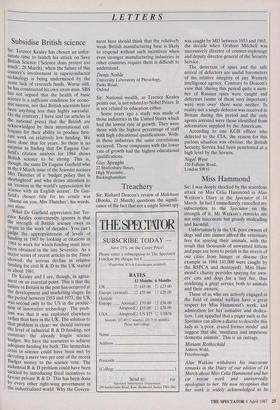LETTERS Subsidise British science
Sir: Terence Kealey has chosen an unfor- tunate time to launch his attack on Save British Science (`Science dons protest too much', 28 March), when the future of this country's involvement in superconductor technology is being undermined by the acute lack of research funds. Worse still, he has constructed his own straw man. SBS has not argued that the health of basic science is a sufficient condition for econo- mic success, nor that British scientists have been anything less than highly sucessful. On the contrary, I have said (in articles in the national press) that the British are acknowledged by their international col- leagues for their ability to produce first- rate work on relatively low funding. We have done that for years. So there is no surprise in finding that Dr Eugene Gar- field's citation analysis for 1984 shows British science to be strong. This is, though, the same Dr Eugene Garfield who in the 9 March issue of the Scientist accuses Mrs Thatcher of a 'budget policy that is shortsighted' and who draws attention to an 'erosion in the world's appreciation for science with an English accent'. Dr Gar- field's chosen title for his article was `Shame on you, Mrs Thatcher': his words, not mine.
What Dr Garfield appreciates but Ter- ence Kealey conveniently ignores is that the strength of British science owes its origin to the work of decades. You can't judge the appropriateness of levels of funding in 1987 by looking at citations in 1984 to work for which funding must have been obtained in the late Seventies. As a major series of recent articles in the Times showed, the serious decline in relative funding for civil R & D in the UK started in about 1981.
Dr Kealey and I are, though, in agree- ment on an essential point. This is that the failure in Britain in the past has occurred at the development and marketing stages. In the period between 1953 and 1973, the UK was second only to the US in the produc- tion of innovative technology. The prob- lem was that it was exploited elsewhere rather than here in the UK. The solution to that problem is clear: we should increase the level of industrial R & D funding, not constrain the already fragile science budget. We have the resources to achieve adequate funding for both. The immediate crisis in science could have been met by devoting a mere two per cent of the recent Budget money to the science vote. The industrial R & D problem could have been tackled by introducing fiscal incentives to favour private R & D. This has been done by every other right-wing government in the industrialised world. Why the Govern- ment here should think that the relatively weak British manufacturing base is likely to respond without such incentives when even stronger manufacturing industries in other countries, require them is difficult to understand.
Denis Noble
University Laboratory of Physiology, Parks Road, Oxford


























































 Previous page
Previous page